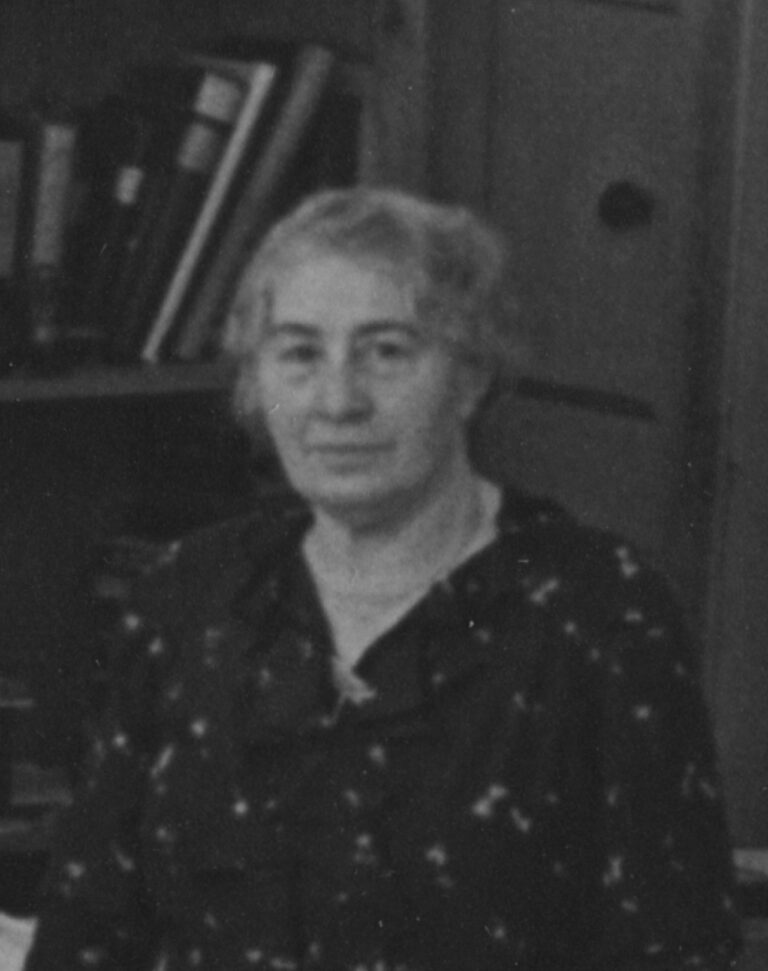In her childhood, educational opportunities for girls were severely limited. Additionally, Wilde was hard of hearing. As a result, many of the professions available to women, such as teaching or working at a telegraph office, were also out of her reach. Despite these barriers, she found her way into the world of libraries, a new field for women in Germany at that time. Her first job was at the private library of Salomon Neumann, one of the founders of the Institute, known among other things for his coarse language.
Around 1910, Wilde began her work at the library of the Higher Institute for Jewish Studies, where she played a crucial role. She oversaw the extensive project of re-cataloguing the library’s holdings according to the Prussian Instructions, a task that took fifteen years. In 1926, she became the library’s director, likely the first woman to lead a scholarly library in Germany. Under her watch, the library expanded its opening hours, increased its staff and continued to grow despite its limited budget.
Wilde was known for her warm-hearted and maternal nature. She supported students, especially those from Eastern Europe, by offering not only academic but also practical help, like modernising their clothing or mending torn shirts. Hans-Erich Fabian, one of her former colleagues, would later say, “For a generation of Jewish scholars, rabbis and teachers, Jenny Wilde was more than just the custodian of the Institute’s treasured books; she was a source of advice and help.”
Resistance at the library
During the Nazi era, Wilde showed her exceptional talent for improvisation. Despite the ban on Jewish libraries owning books by “Aryan” authors and the increasingly difficult acquisition of new books, she, along with her assistant Adele Sperling, kept the operation running, enabling Jewish readers to continue accessing books.
In 1942, when the Nazis closed the Higher Institute for Jewish Studies and wanted to confiscate its book collection, the most valuable works had already been smuggled abroad thanks to the initiative of Jenny Wilde and her colleagues. These books were entrusted to Alexander Guttmann, the Talmud professor at the Institute and a Hungarian citizen who managed to flee Germany in 1940. Guttmann took these books at great personal risk, successfully keeping them out of Nazi hands.
In 1943, Jenny Wilde was deported to Theresienstadt, where she was assigned to the “Talmud Commando”. This unit, consisting of interned Jewish scholars and experts, was forced by the Nazis to catalogue confiscated Jewish books and manuscripts for use in the discipline the Nazis called Judenforschung, or “research on Jews”. In this environment, Wilde worked under extreme conditions, confronted with the cynical misuse of her expertise and love for books.
Jenny Wilde lived through the war and returned to Berlin after being liberated in May 1945. Upon her arrival, she discovered she was penniless. Her home was destroyed, her possessions had been seized by the state and her employer, the Institute, no longer existed. She spent her later years in a Berlin home for elderly survivors of concentration camps. Wilde wished to emigrate, and indeed received invitations from friends who had found refuge around the world. Although she wanted to accept the invitations – nothing kept her in Berlin – she first wanted to “settle her affairs”, as she put it, and secure a small pension to avoid imposing on her friends. Unfortunately, she died in 1949 in Berlin before she could fulfill these plans.
“You cannot imagine the extent of Berlin’s destruction. The Institute is a pile of rubble, there is no Jewish life… The Jewish Community library is no more. There is no hope or expectation of a Jewish revival here.”
